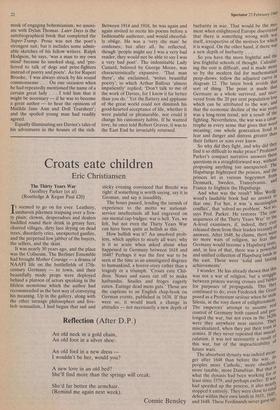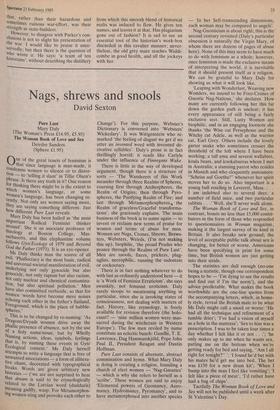Croats eate children
Eric Christiansen
The Thirty Years War Geoffrey Parker (et al) (Routledge & Kegan Paul £20) Tt seemed to go on for ever. Leathery, lunshaven pikemen traipsing over a fros- ty plain; clowns, desperadoes and dealers huddled round their drink in greasy furs; charred villages, dirty lace drying on dead trees, disorderly cries, unexpected gunfire, and the perpetual low jabber of the buyers, the sellers, and the skint.
It was nearly 30 years ago, and the place was the Coliseum. The Berliner Ensemble had brought Mother Courage — a drama of NAAFI life on the battlefields of 17th- century Germany — to town, and their beautifully made props were deployed behind a platoon of actors speaking in the lifeless monotone which the author had recommended as the best way of conveying his meaning. Up in the gallery, along with the other teenage philosophers and five- bob sensualists, I had begun that sad and sticky evening convinced that Brecht was right: if something is worth saying, say it in German, and say it inaudibly.
The hours passed, lending the tarnish of experience to the motto we national- service intellectuals all had engraved on our mental cap-badges: war is hell. Yes, we felt, but not even the Thirty Years War can have been quite as hellish as this.
How hellish was it? An unsolved prob- lem, which applies to nearly all wars: why is it so acute when asked about what happened in Germany between 1618 and 1648? Perhaps it was the first war to be seen at the time as an unmitigated disgrace to humankind, a horror-story rather than a tragedy or a triumph. 'Croats eate Chil- dren. Noses and eares cut off to make hatbandes. Snailes and froges eagerly eaten. Eatinge dead mens guts.' Those are the captions to an English chap-book on German events, published in 1638. If that were so, it would mark a change in attitudes — not necessarily a new depth of barbarity in war. That would be the mo- ment when enlightened Europe discovered that there is something wrong with war itself, irrespective of the motives for which it is waged. On the other hand, if there was a new depth of barbarity . . . So you have the more frightful and the less frightful schools of thought. Calculat- ing the cost is difficult, and is made more so by the modern fad for mathematical peep-shows: follow the adjusted curve in diagram 12. The latest book avoids that sort of thing. The point is made that Germany as a whole survived, and reco- vered from the 20 per cent population loss, which can be attributed to the war, and that the economic decline of the war Years was a long-term trend, not a result of the fighting. Nevertheless, the war was a catas- trophe in every sense that gives that word meaning; one whole generation lived in fear and danger and distress greater than their fathers or sons ever knew. So why did they fight, and why did they find it so difficult to make peace? Professor Parker's compact narrative answers the questions in a straightforward way, without proposing anything too unexpected. The Hapsburgs frightened the princes, and the princes let in various bogeymen from Denmark, Sweden, Transylvania, and i France to frighten the Hapsburgs. And what was the result? Miss Wedt wood's laudable book had no answer to that one. For her, it was 'a meaningless conflict', that 'solved no problem'. Not s°, says Prof. Parker. He restores 'The cow sequences of the Thirty Years War' to the A-level examiners, if, indeed, they ever. released them from their leaden treasurY answers. After 1648, he claims, there were no more wars of religion, no fear that Germany would become a Hapsburg state, and, in lieu of that, there was a powerful and unified collection of Hapsburg lands in the east. These were 'solid and lasting achievements'. I wonder. He has already shown that this was not a war of religion, but a struggle between princes waving crosses and bibles for purposes of propaganda. This they continued to do; even Frederick the Great posed as a Protestant saviour when he stole Silesia, in the rosy dawn of enlightenment: The emperors' attempt to assume real control of Germany both caused and pro- longed the war, but not even in the 1620s were they anywhere near success. They miscalculated, when they put their trust l.11 armies. If they never repeated that miscal- culation, it was not necessarily a result °, this war, but of the impracticability °` future wars. The absorbent dynasty was indeed stron- ger after 1648 than before the war, its peoples more Catholic, more obedient, more taxable, more Danubian. But that Is, what the dynasts had been working for at least since 1579, and perhaps earlier. If war had speeded up the process, it also nearly stopped it entirely. They were close to total defeat within their own lands in 1631,1645, and 1648. These Ferdinands never gave tip; that, rather than their hazardous and sometimes ruinous war-effort, was their strength as state-builders. However, to disagree with Parker's con- clusions is not to slight his presentation of the war. I would like to praise it unre- servedly; but then there is the question of Who wrote it. He says: 'a team of ten historians', without describing the distillery from which this smooth blend of historical malts was induced to flow. He gives ten names, and leaves it at that. Has plagiarism gone out of fashion? It is sad to see an essential tool of the historian's work-box discarded in this cavalier manner; never- theless, the old grey mare reaches Widdi- combe in good health, and all the jockeys with her.











































 Previous page
Previous page